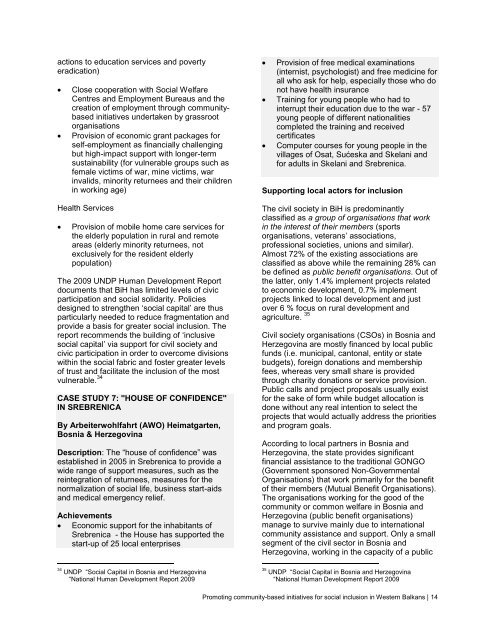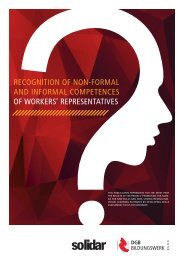Promoting community-based initiatives for social inclusion ... - Solidar
Promoting community-based initiatives for social inclusion ... - Solidar
Promoting community-based initiatives for social inclusion ... - Solidar
Create successful ePaper yourself
Turn your PDF publications into a flip-book with our unique Google optimized e-Paper software.
actions to education services and poverty<br />
eradication)<br />
<br />
<br />
Close cooperation with Social Welfare<br />
Centres and Employment Bureaus and the<br />
creation of employment through <strong>community</strong><strong>based</strong><br />
<strong>initiatives</strong> undertaken by grassroot<br />
organisations<br />
Provision of economic grant packages <strong>for</strong><br />
self-employment as financially challenging<br />
but high-impact support with longer-term<br />
sustainability (<strong>for</strong> vulnerable groups such as<br />
female victims of war, mine victims, war<br />
invalids, minority returnees and their children<br />
in working age)<br />
Health Services<br />
<br />
Provision of mobile home care services <strong>for</strong><br />
the elderly population in rural and remote<br />
areas (elderly minority returnees, not<br />
exclusively <strong>for</strong> the resident elderly<br />
population)<br />
The 2009 UNDP Human Development Report<br />
documents that BiH has limited levels of civic<br />
participation and <strong>social</strong> solidarity. Policies<br />
designed to strengthen „<strong>social</strong> capital‟ are thus<br />
particularly needed to reduce fragmentation and<br />
provide a basis <strong>for</strong> greater <strong>social</strong> <strong>inclusion</strong>. The<br />
report recommends the building of „inclusive<br />
<strong>social</strong> capital‟ via support <strong>for</strong> civil society and<br />
civic participation in order to overcome divisions<br />
within the <strong>social</strong> fabric and foster greater levels<br />
of trust and facilitate the <strong>inclusion</strong> of the most<br />
vulnerable. 34<br />
CASE STUDY 7: "HOUSE OF CONFIDENCE"<br />
IN SREBRENICA<br />
By Arbeiterwohlfahrt (AWO) Heimatgarten,<br />
Bosnia & Herzegovina<br />
Description: The “house of confidence” was<br />
established in 2005 in Srebrenica to provide a<br />
wide range of support measures, such as the<br />
reintegration of returnees, measures <strong>for</strong> the<br />
normalization of <strong>social</strong> life, business start-aids<br />
and medical emergency relief.<br />
Achievements<br />
Economic support <strong>for</strong> the inhabitants of<br />
Srebrenica - the House has supported the<br />
start-up of 25 local enterprises<br />
34 UNDP “Social Capital in Bosnia and Herzegovina<br />
“National Human Development Report 2009<br />
<br />
<br />
<br />
Provision of free medical examinations<br />
(internist, psychologist) and free medicine <strong>for</strong><br />
all who ask <strong>for</strong> help, especially those who do<br />
not have health insurance<br />
Training <strong>for</strong> young people who had to<br />
interrupt their education due to the war - 57<br />
young people of different nationalities<br />
completed the training and received<br />
certificates<br />
Computer courses <strong>for</strong> young people in the<br />
villages of Osat, Sućeska and Skelani and<br />
<strong>for</strong> adults in Skelani and Srebrenica.<br />
Supporting local actors <strong>for</strong> <strong>inclusion</strong><br />
The civil society in BiH is predominantly<br />
classified as a group of organisations that work<br />
in the interest of their members (sports<br />
organisations, veterans‟ associations,<br />
professional societies, unions and similar).<br />
Almost 72% of the existing associations are<br />
classified as above while the remaining 28% can<br />
be defined as public benefit organisations. Out of<br />
the latter, only 1.4% implement projects related<br />
to economic development, 0.7% implement<br />
projects linked to local development and just<br />
over 6 % focus on rural development and<br />
agriculture. 35<br />
Civil society organisations (CSOs) in Bosnia and<br />
Herzegovina are mostly financed by local public<br />
funds (i.e. municipal, cantonal, entity or state<br />
budgets), <strong>for</strong>eign donations and membership<br />
fees, whereas very small share is provided<br />
through charity donations or service provision.<br />
Public calls and project proposals usually exist<br />
<strong>for</strong> the sake of <strong>for</strong>m while budget allocation is<br />
done without any real intention to select the<br />
projects that would actually address the priorities<br />
and program goals.<br />
According to local partners in Bosnia and<br />
Herzegovina, the state provides significant<br />
financial assistance to the traditional GONGO<br />
(Government sponsored Non-Governmental<br />
Organisations) that work primarily <strong>for</strong> the benefit<br />
of their members (Mutual Benefit Organisations).<br />
The organisations working <strong>for</strong> the good of the<br />
<strong>community</strong> or common welfare in Bosnia and<br />
Herzegovina (public benefit organisations)<br />
manage to survive mainly due to international<br />
<strong>community</strong> assistance and support. Only a small<br />
segment of the civil sector in Bosnia and<br />
Herzegovina, working in the capacity of a public<br />
35 UNDP “Social Capital in Bosnia and Herzegovina<br />
“National Human Development Report 2009<br />
<strong>Promoting</strong> <strong>community</strong>-<strong>based</strong> <strong>initiatives</strong> <strong>for</strong> <strong>social</strong> <strong>inclusion</strong> in Western Balkans | 14
















